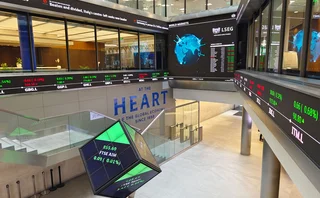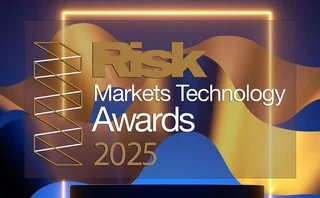
Exchange innovation of the year: CME Group
Risk Awards 2017: Patience pays off with spectacular success of Ultra 10 Treasury futures

The opportunity was clear. With the cost to banks of holding US Treasuries increasing, market participants have been looking for a liquid, capital-light way to maintain constant rate exposure. CME recognised the potential for a futures contract that would exactly match the economics of on-the-run 10-year Treasury notes – in fact, it spotted the gap two years ago, but instead of rushing a product to market, it launched an extensive consultation with market participants on product design.
That patience is paying off. Since its launch on January 10, 2016, CME's Ultra 10 US Treasury Note future has surpassed expectations, becoming the most successful product launch in the exchange's history as measured by average daily volume, open interest and number of participants.
"With the advent of balance sheet and capital constraints, and in particular the declining repo market, the industry was looking for a new Treasury future that would pinpoint the 10-year point on the curve," says Sean Tully, senior managing director of financial products and over-the-counter products at CME Group. "There was a lot of outreach to the market about what is the best design, and a very careful launch. There's been a huge uptake."
As of January 17, it had traded more than 17.9 million contracts and $1.2 trillion in notional value, with nearly 300,000 contracts in open interest. In December 2016, average daily volume was more than 87,000 contracts. On December 15 alone, it traded more than 186,000 contracts.
The futures allow for delivery of original issue 10-year US Treasury notes with remaining terms to maturity at delivery of at least nine years, five months and not more than 10 years. By comparison, CME's existing 10-Year US Treasury Note product allows for delivery of notes with a remaining term to maturity of at least six and a half years, but not more than 10 years, from the first day of the delivery month. The stricter duration criteria ensure a more precise replication of 10-year cash Treasury exposure.
Positive feedback
User feedback has been overwhelmingly positive: "Ultra 10 is an extremely important product," says a senior fixed-income derivatives trader at a large asset manager. "It's become an important part of the futures complex. We use the Ultra 10 extensively, as do other market participants. The Treasury futures that trade on CBOT [CME's Chicago Board of Trade] are more liquid than cash Treasuries because of their infrastructure, liquidity providers and electronic trading. People use Treasury futures to transfer risk, whether they're hedging or adding to risk based on their outlook."
"Our experience with CME is we have found them to be a great partner. CME has worked with the industry on new products, on being inclusive," agrees the head of futures at one large bank.
The development process for the Ultra 10s was painstaking – in a July 2015 webinar that drew some 500 attendees, CME Group pitched three contract designs it was considering, following up with individual company meetings.
"We let the industry know we were going to spend the next several months getting their feedback on the three different designs," Tully says. "We held more than 100 individual client meetings. The clear design was the one we eventually launched, which has a cheapest-to-deliver basket of nine years, five months up to 10 years."
Tully says there has been no cannibalisation of the existing contract by the Ultra 10, though; in fact, the bourse sees the two contracts as complementary, with interest in its classic 10-Year Treasury Note futures continuing to grow in aggregate since the launch of the Ultra 10s – evidence of the growing role for futures as dealers pull back from the cash Treasuries market. In 2011 and 2012, average daily volume of CME's Treasury futures was running between 55% and 60% of the cash Treasuries market. Today, that figure is close to 80%.
"You can see much greater penetration over the past five years among hedge funds, asset managers, banks and proprietary trading firms," says Tully.
Only users who have a paid subscription or are part of a corporate subscription are able to print or copy content.
To access these options, along with all other subscription benefits, please contact info@risk.net or view our subscription options here: http://subscriptions.risk.net/subscribe
You are currently unable to print this content. Please contact info@risk.net to find out more.
You are currently unable to copy this content. Please contact info@risk.net to find out more.
Copyright Infopro Digital Limited. All rights reserved.
As outlined in our terms and conditions, https://www.infopro-digital.com/terms-and-conditions/subscriptions/ (point 2.4), printing is limited to a single copy.
If you would like to purchase additional rights please email info@risk.net
Copyright Infopro Digital Limited. All rights reserved.
You may share this content using our article tools. As outlined in our terms and conditions, https://www.infopro-digital.com/terms-and-conditions/subscriptions/ (clause 2.4), an Authorised User may only make one copy of the materials for their own personal use. You must also comply with the restrictions in clause 2.5.
If you would like to purchase additional rights please email info@risk.net
More on Awards
Clearing house of the year: LCH
Risk Awards 2025: LCH outshines rivals in its commitment to innovation and co-operation with clearing members
Best use of machine learning/AI: CompatibL
CompatibL won Best use of machine learning/AI at the 2025 Risk Markets Technology Awards for its use of LLMs for automated trade entry, redefining speed and reliability in what-if analytics
Markets Technology Awards 2025 winners’ review
Vendors jockeying for position in this year’s MTAs, as banks and regulators take aim at counterparty blind spots
Equity derivatives house of the year: Bank of America
Risk Awards 2025: Bank gains plaudits – and profits – with enhanced product range, including new variants of short-vol structures and equity dispersion
Law firm of the year: Linklaters
Risk Awards 2025: Law firm’s work helped buttress markets for credit derivatives, clearing and digital assets
Derivatives house of the year: UBS
Risk Awards 2025: Mega-merger expected to add $1 billion to markets revenues, via 30 integration projects
Interest rate derivatives house of the year: JP Morgan
Risk Awards 2025: Steepener hedges and Spire novations helped clients navigate shifting rates regime
Currency derivatives house of the year: UBS
Risk Awards 2025: Access to wealth management client base helped Swiss bank to recycle volatility and provide accurate pricing for a range of FX structures







